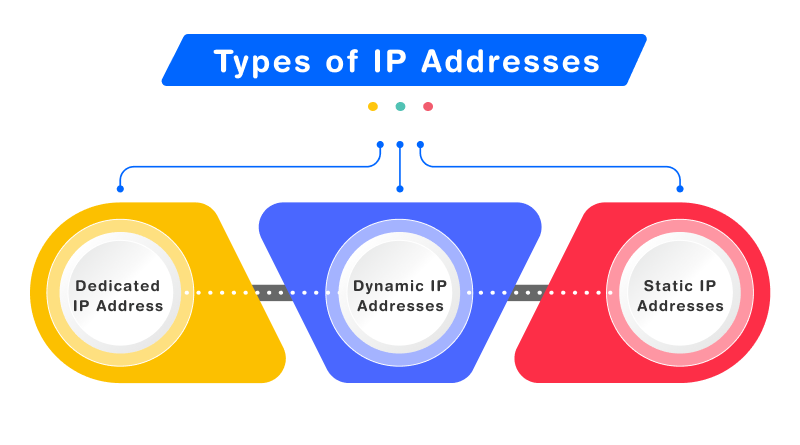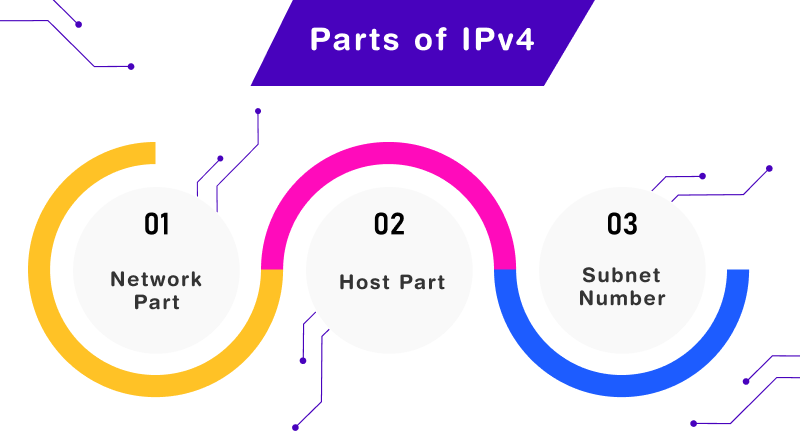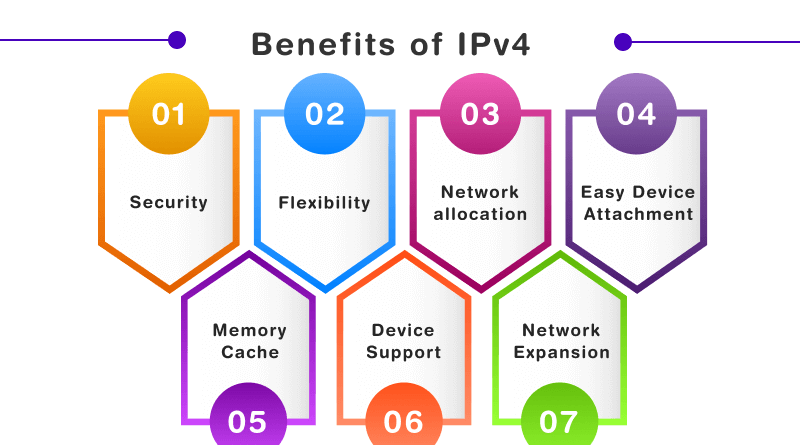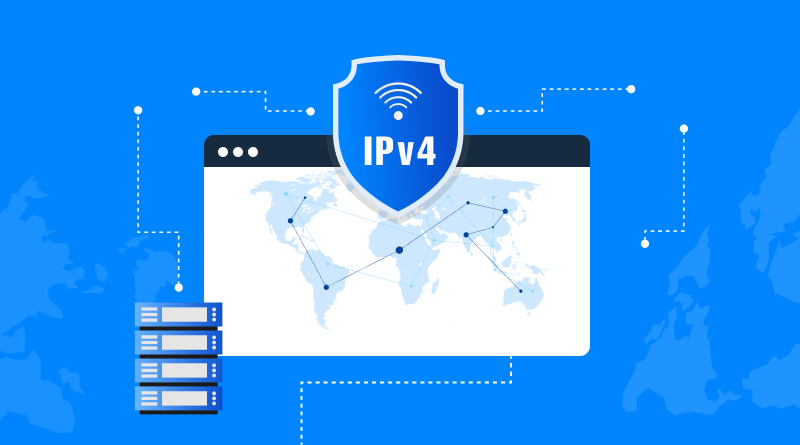Do you know what is the communication channel of computers and web hosting servers? It is called the Internet Protocol Address or IP address. Because of IP addresses, you can send emails and even read this blog. There are different versions available of this address which are IPv4 and IPv6. If you’re curious about what is IPv4, this blog breaks it down for you along with IPv6. And what is IPv6? All of these details will be discussed here briefly.
Table of Content
What is IP Full Form?
IP stands for Internet Protocol which is a set of rules governing the format of data sent via the Internet or local network. Now, the catch is that these rules will not be defined as sentences. But, there are numerical digits like 192.158.1.38. The range of these numerical digits would lie between 0 to 255.
You may think of getting these numbers randomly but IANA (Internet Assigned Numbers Authority) allocates these numbers. IANA is a division of ICANN (Internet Corporation for Assigned Names and Numbers) which was established in 1998 to maintain the security of the Internet and allow it to be usable by all.
What is DNS?
Before reading more about IPv4 basics, you should understand what DNS is all about. DNS means Domain Name System which is the phone book of the internet that translates IP address to domain names. This is the language the internet understands.
With DNS, you allow computers, web hosting servers, and other networked devices each with its unique IP addresses to talk to each other. And it gets users to the website they’re looking for. If you want to edit this address, refer to our guide: How to Edit DNS?
Types of IP Addresses

Dedicated IP Address
With VPS hosting plans and dedicated hosting plans, you get a dedicated IP address that is solely allocated to you. Unlike shared hosting, your IP address will not be shared among different clients. Hence, it is easier to share files and data within an organization using FTP (File Transfer Protocol). It brings the DNS support, better accessibility, and privacy.
Dynamic IP Addresses
A dynamic IP address is a temporary IP address that a network assigns to a device when it connects and changes each time the device reconnects. Dynamic IP addresses are assigned using either DHCP or PPPoE. The server provides the IP address to the client for a specific period of time, called the lease time. When the lease expires, the server reclaims the address and can assign it to another client.
Static IP addresses
A static IP address remains the same over time, unlike a dynamic IP address. As soon as a network assigns an IP address, it remains that way. Static IP addresses are not required for most individuals and businesses, but for businesses that plan to host their server, they are essential. Static IP addresses ensure that websites and email addresses assigned to them have a consistent IP address – vital if you want other devices to be able to find them consistently.
What is IPv4? Explained in a Nutshell
IPv4 explained in simple terms: Internet Protocol version 4 or IPv4 is a 32-bit string of numbers that uniquely identifies a device’s network interface. Think of it like a phone book for the internet, with IP addresses acting as phone numbers and devices acting as phones. IPv4 uses a series of numbers separated by dots (like 172.217.160.1) to identify each device. It’s the foundation upon which most internet traffic still flows today.
Parts of IPv4

- Network Part: The network part indicates the distinctive variety that’s appointed to the network which conjointly identifies the category of the network that’s assigned.
- Host Part: The host part is a part of the IPv4 address which uniquely identifies the machine on your network and is assigned to every host. Hosts on the network share the same network part, but the host half must differ.
- Subnet Number: Local networks that have massive numbers of hosts and that are divided into subnets and subnet numbers are assigned to this nonobligatory part of IPv4.
Benefits of IPv4
If you’re trying to better your understanding of IPv4, here are some of the benefits—along with a quick look at the IPv4 structure.

- Security: IPv4 allows for encryption of data and traffic to maintain privacy and security.
- Flexibility: IPv4 makes routing more efficient and flexible across multiple ports.
- Network allocation: IPv4 allows for significant network allocation.
- Easy Device Attachment: IPv4 makes it easy to attach multiple devices across a large network.
- Memory Cache: IPv4 uses less memory cache to store and retrieve IP addresses faster.
- Device Support: IPv4 is older than IPv6, so hundreds of thousands of devices are already integrated and supported.
- Network Expansion: It’s easier to expand a network with IPv4 by purchasing more addresses than with IPv6.
What is IPv6?
IPv6 is the next-gen Internet Protocol (IP) address that is intended to replace conventional IPv4. It is an internet protocol that many ISPs use to date. To communicate between devices connected to the Internet, every computer, mobile phone, home automation component, and IoT sensor needs a numerical IP address. As a result of the proliferation of so many connected devices, IPv4 is running out of addresses.
Benefits of IPv6
IPv6 has different advantages as it is the latest Internet Protocol used in the industry.
- Larger Address Space: In contrast to IPv4, IPv6 has a bigger address space which easily supports the expanding internet-connected devices and users.
- Improved Security: IPv6 is more secure in terms of internet communication. It protects your connection from eavesdropping, manipulation, and impersonation.
- Simplified Header Format: With IPv4 there are no massive processing costs involved which boosts the speed of internet connection. Also, it features a simpler and effective header structure which makes the connection smoother for internet service providers.
Which IP Based Server MilesWeb Provide?
MilesWeb offers servers that support both public vs private IPv4 configurations across their web hosting plans. Also, if you opt for the colocation server hosting services, they include a static IPv4 address.
IPv4 vs IPv6: Which Is Better?
There is a core comparison between IPv4 vs IPv6 in the following table. Refer to this table and we hope it helps in making informed decisions.
| Features | IPv4 | IPv6 |
| Address Space | 32-bit | 128-bit |
| Number of Unique Addresses | Approximately 4.3 billion | Virtually unlimited (3.4 x 1038) |
| Security | No built-in security features | Built-in support for IPsec encryption and authentication |
| Deployment Status | Widely used, but depleting address space | Growing adoption, but not yet dominant |
| Autoconfiguration | Limited autoconfiguration | Built-in autoconfiguration for easier network management |
| Broadcast | Supports broadcast messages | Uses multicast and anycast for more efficient group communication |
Let’s talk IPv4 addresses – the invisible ID tags that let our devices chat across the vast internet. They’ve been the workhorses of the web for a long time, kind of like the trusty flip phones of the communication world. They did the job, but limitations arose!
Here’s the thing: IPv4 uses a 32-bit system, which creates a finite number of addresses. Think of it like a limited number of tables at a bustling restaurant – eventually, everyone won’t have a seat. With the internet’s constant growth, IPv4 is reaching its capacity.
That’s where the next-gen protocol, IPv6, steps in. It’s like a massive expansion to the restaurant, offering way more tables (think 128-bit addresses!). This ensures everyone has a place at the digital table for the foreseeable future.
FAQs
What is IPv4 address?
An IPv4 address, short for Internet Protocol version 4 address, is a unique identifier assigned to each device on a network that uses the Internet Protocol for communication. It’s like a digital mailing address that allows information to be sent and received specifically to your device.
What is the purpose of an IPv4 address?
The main purpose of an IPv4 address is twofold: identification and location addressing. It acts as an identification tag for your device on a network, enabling communication between devices. It also helps pinpoint the location of a device on the internet, allowing data to be routed to the correct destination.
What are private IPv4 addresses?
There are two categories of IPv4 addresses: Public and private. Public addresses are unique and identifiable on the global internet, assigned by an Internet Service Provider (ISP) to your network. Private addresses, on the other hand, are for internal use within a private network and are not routable on the public internet. Common private address ranges include 10.0.0.0 to 10.255.255.255, 172.16.0.0 to 172.31.255.255, and 192.168.0.0 to 192.168.255.255.
How can I find my IPv4 address?
Finding your IPv4 address is a straightforward process. Here are some general methods depending on your device:
1. Windows: Open the Command Prompt and type “ipconfig”. Press Enter and look for the IPv4 address listed.
2. Mac: Go to System Preferences > Network. Select your network connection and click on “Advanced”. Under the TCP/IP tab, you’ll see your IPv4 address.
3. Android: Go to Settings > Network & internet. Tap on your Wi-Fi network and look for the IP address.
4. iPhone/iPad: Go to Settings > Wi-Fi. Tap the information icon (i) next to your Wi-Fi network and look for the IP Address.








